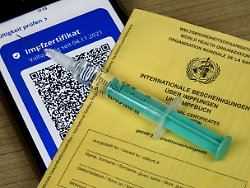Tuesday, December 7th, 2021
Citizens’ trust in danger
WHO: Compulsory vaccination as an “absolute last resort”
The Bundestag is debating whether certain professional groups should be vaccinated. If the future Chancellor Scholz has his way, Parliament should soon also vote on a general vaccination requirement. The WHO warns against the collateral damage of such a measure.
The World Health Organization (WHO) has called for compulsory corona vaccination only to be considered as a last resort in the fight against the pandemic. Vaccination regulations “are an absolute last resort and only to be used after all other feasible options to improve vaccination activity have been exhausted,” WHO Regional Director for Europe Hans Kluge said at an online press conference in Copenhagen.
Kluge stressed that when considering compulsory vaccination, one must also consider how such a measure would affect “public confidence”. In Austria, a general compulsory corona vaccination should come into force in February. In Germany, too, this measure is currently being discussed in view of a violent fourth corona wave.
The designated Federal Chancellor Olaf Scholz recently announced that a legislative procedure for the general compulsory corona vaccination would be initiated “promptly”. Every MP should be able to vote “according to his conscience” without being forced to vote in a parliamentary group.
At the initiative of the traffic light parliamentary groups, the Bundestag wants to introduce legal innovations today to contain the corona pandemic. This includes the facility-related vaccination obligation, which has been planned for some time, and which should apply to staff in old people’s or nursing homes, for example. According to the draft law, anyone who works there must submit proof of vaccination or recovery by March 15, or demonstrate that they cannot be vaccinated.
Better protect children from Corona
WHO Regional Director Kluge also called for children to be better protected against the corona virus. Children between five and 14 years are currently most affected by the infections. It is currently not “unusual to find an incidence two to three times higher among young children than the population average”. The health risks of this development extended “beyond the children themselves,” said Kluge. After all, they could pass the corona infection on to parents and grandparents.
Good ventilation, the wearing of protective masks and regular corona tests should therefore be standard at all primary schools in order to create a safe learning environment and avoid school closings. Regarding corona vaccinations for children, Kluge said that these had to be “discussed and considered nationally”.
WHO Europe is responsible for 53 countries and areas not only in Europe but also in Central Asia. Another corona wave is currently making many countries difficult to cope with. The new Coronavirus variant Omikron is also causing concern. This actually gives cause “to be concerned and cautious,” said Kluge.
The current major challenge is the Delta variant of the coronavirus, which is also prevalent in Europe, and if “we succeed against Delta today, this will be a victory against Omikron tomorrow,” warned the head of WHO Europe.
